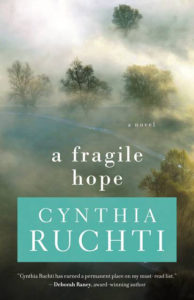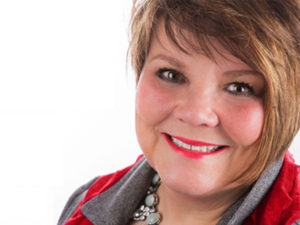We welcome Cynthia Ruchti as our Best Selling Author
Can you share a little about your recent book –A Fragile Hope is a book that has been a long time coming. The idea for it simmered on a back burner for years, waiting for the right moment, the right method, the right approach to the point of view characters.
Josiah Chamberlain is well-known for his marriage and family enrichment seminars, counseling, and books. He’s especially known for his quick quips that seem to encapsulate his dynamic advice in a few pithy words. But all his words fail him on the night it appears his wife—Karin—has betrayed him, left him for another man. But no one can explain what happened. The man driving his wife’s car when it crashed is dead and she is locked in deep brain trauma. If he walks away from her side, his career is over. If he stays, his marriage may already be over. What does love do when it’s been betrayed? Or does he even know the true definition of love? Did Karin? Will he ever find out?
It wouldn’t be so complicated if he could talk to her…and if it weren’t for the tiny heartbeat she carries.
Why do you write? Do you have a theme, message, or goal for your books?
An overarching theme that makes its way into all of my books is the idea of being hemmed in hope. “I can’t unravel. I’m hemmed in hope.” My characters don’t always feel that way at the beginning of the story. But they are all confronted with the possibility before the story’s end.
I write to tell stories hemmed in hope. But I also write because I believe that fiction is a powerful communicator. Many of us learn best through story. Story sticks with us. Story engages the emotions as well as the intellect. Story can express the inexpressible. Every culture since Adam and Eve has used storytelling to communicate deep truths. Not only is our culture no exception, but it’s perhaps more important than ever in an era when the art and dance of story are threatened by words like quick, easy, uncomplicated, and comfortable. Our character grows and expands as we walk the path fiction’s characters take.
How long have you been writing? And how long did it take you to get your first major book contract?
I wrote magazine articles, newspaper articles, and baby shower devotions as a sidelight to homemaking and even during the years when I worked in a chemistry lab. But then I was given the rare privilege of writing and producing a 15 minute scripted radio broadcast. That broadcast aired daily on 48 stations across the country at its peak. The program recently retired after 33 years on the air.
Even after all those words on paper, it still took concerted study to learn how to write a novel and a full-length nonfiction book. I took courses, joined an online group, signed on with a critique group, attended writers’ conferences, and soaked up all the education I could. From the time I first seriously considered writing a novel until my first novel was published was about ten years. Since that debut novel in 2010, I’ve been blessed to have written 21 other books or compilations, both fiction and nonfiction.
How long does it take you to write a book?
With a schedule like the above, it means I have to write at what might be considered break-neck speed. I have a day job, too—working for American Christian Fiction Writers as their professional relations liaison. I’m often musing on a book for months before I actually sit down to write, and then am tasked with writing lots of words in a short period of time. That’s not all bad, because it keeps me conscious that it is beyond me, that I can’t do this—nor should I try—without joining God in writing the story HE wants told. It’s a humbling process. But I’m thrilled with the discovery process—being surprised by the story as it unfolds.
What’s your writing work schedule like?
Others will have much wiser answers to this question. I’m working on a more ideal response, making some significant changes so that I can write when I’m most productive—which is normally between ten in the morning and five in the afternoon. I find that if I get the less-creative tasks done by ten, then I can focus better on what demands more creativity. It’s been working well for me to work intently for fifty minutes, then take a five- or ten-minute break, then immediately go back to writing, with the timer set for another fifty minutes. Others have their own variations of that process. We all need to get up and moving. A good story can keep us so engaged, enthralled that we forget to move, forget to eat, forget to…oh, say, dust and vacuum. The timer method helps me make progress on both my writing and breathing.
Do you have an interesting writing quirk? If so, what is it?
It’s just the way I’m wired. Because I have a strong editing side as well, I seldom write more than one draft. It’s happened. But usually, when I finish my first draft and go back over the work, the changes are fairly minor before I send it to the in-house or freelance editor. I don’t think that’s quirky, but I do realize it’s not normal. Maybe it’s from writing radio scripts all those years. Once I learned what my editing radio partner was likely to catch, I trained myself to avoid those issues before she could whip out her red pen. But that doesn’t prevent me from having to rewrite whole sections sometimes after I hear back from the professional editor.
What has been your greatest joy(s) in your writing career?
Having a book recognized by an industry-respected award like the Carols or the Christy Award or ECPA Book of the Year or Christian Retailing’s BEST Awards and others is rewarding. But JOY comes from another source. It comes from watching a book resonate with a reader and help bring healing or resolution or restoration or understanding. Few things are more thrilling for this writer’s heart.
What has been your darkest moment(s)?
It’s been hard to watch several publishers make the decision to close their fiction departments. I’m not alone in having been affected by some of those changes. Hard as that has been to weather, they haven’t always been “dark” moments. Difficult, certainly. Sometimes even heartbreaking as we think about shrinking opportunities for authors yet increasing need for great books for readers.
Which of your books is your favorite?
If I’m doing my job well, it should be the one I last wrote. My hope would be that every book I write is better than the one before because of what I’ve learned about the craft, about myself, about my readers, about storytelling, and about the God who created story as a method of communication. So, I’d have to say my favorite so far would be the one releasing in April 2017—A Fragile Hope. It’s certainly an emotionally gripping story, yet laced with tenacious threads of hope.
Who is your favorite author to read?
I’m a big fan of Marilynne Robinson’s storytelling ability.
What advice can you give aspiring writers that you wished you had gotten, or that you wished you would have listened too?
I wish I had established a more intentional record-keeping system earlier in the game. Who would know that down the road I’d accidentally use a character name or occupation I’d used eight years earlier? I’m making up for that neglect now, but it would have been easier if I’d started with a careful record-keeping habit.
How many times in your career have you experienced rejection? How did they shape you?
I’ve lost count. Seriously. And it has nothing to do with less-than-perfect record-keeping. Sometimes the rejection has been as simple as tossing and idea to an editor in casual conversation and having him or her discard it without a moment’s delay. Sometimes it’s been rejection of a proposal (or dozens of them). And sometimes the rejection is a bad review. I’ve come to realize that rejection is a natural part of the writing life, and that if I can’t live with that reality, I’d better find something else to do.
Do you have a favorite character or scene in one of your books?
I have a favorite scene in A Fragile Hope, but I can’t tell you what it is without spoiling the plot! A favorite character in As Waters Gone By is Bougie Unfortunate. So many readers have commented on her unique version of grace. And a favorite scene in Song of Silence is the wedding chapel scene. It’s so tender, I can easily tear up just thinking about it.
Where do you get your ideas?
Ideas float past me like dandelion fluff. I keep my wool mittens poised to collect it. I listen deeply. And God has bequeathed me an extra measure of empathy, which is probably why I write women’s fiction.
What are common mistakes you see aspiring writer’s make?
Perhaps the most common mistake aspiring writers make is assuming their work is ready for prime time before it is. When new writers ask me what they need to know to write a novel, it’s tempting to respond, “Do you have twelve years?” Most of us assume that because we HAVE a story in mind, we already have everything we need to ready it for public consumption, to get it to bookshelves of a library or store. It really is a much more complicated, time-consuming, high-investment proposition. Not everyone is willing to pay the price.
Where/How do you recommend writers try to break into the market?
I recommend new writers attend the best writing conference they can afford. Some are specifically fiction-oriented, like the ACFW conference. Others, like Mount Hermon, Blue Ridge Mountains Christian Writers’ Conference, and Write-to-Publish focus on both fiction and nonfiction. A good writers’ conference is always a worthwhile investment…for education, networking, opportunities, guidance, and fellowship.

Amazon: http://amzn.to/2jx0Wv8
Cynthia Ruchti tells stories hemmed in Hope through her novels and novellas, speaking for women’s events and retreats, writers’ events, nonfiction books, and devotionals, drawing from 33 years writing and producing an on-air radio broadcast. Her books have been recognized by RT Reviewers’ Choice, Selah Awards, Gayle Wilson Award of Excellence, CR’s BEST Awards, Carol Award honors, Family Fiction Readers’ Choice Award, ForeWord Reviews Book of the Year honors and others. She has a total of 18 books on the shelves, with more contracted. She and her plot-tweaking husband live in the heart of Wisconsin, not far from their three children and five grandchildren.







No Comments